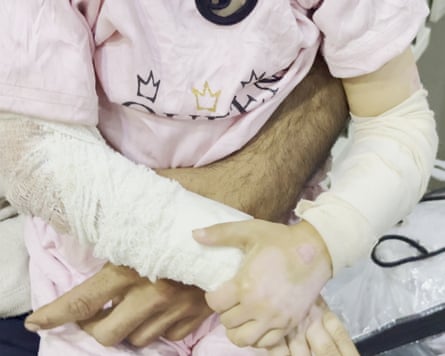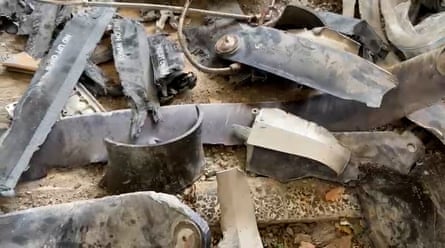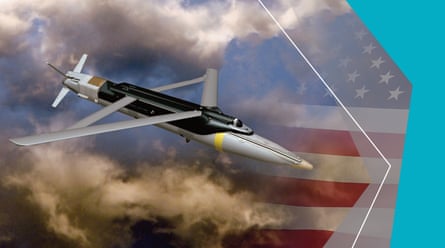Europe’s largest missiles maker, MBDA, is selling key components for bombs that have been shipped in their thousands to Israel and used in multiple airstrikes where research indicates Palestinian children and other civilians were killed.
With concerns mounting about the extent to which European companies may be profiting from the devastation of Gaza, a Guardian investigation with the independent newsrooms Disclose and Follow the Money has examined the supply chain behind the GBU-39 bomb, and the ways in which it has been deployed during the conflict.
MBDA owns a factory in Alabama, US, which produces “wings” that are fitted to the GBU-39, which is made by Boeing. They unfold after launch, allowing the bomb to be guided to its target.
Revenues from the US company MBDA Incorporated flow through MBDA UK, based in Hertfordshire, England, which then passes any profits to MBDA group, headquartered in France. MBDA distributed almost £350m in dividends last year to its three shareholders – Britain’s biggest defence firm BAE Systems, France’s Airbus and Italy’s Leonardo.
In September, the UK foreign minister, David Lammy, suspended some weapons export licences to Israel, citing risk of “serious violations” of international humanitarian law. Lammy said the move was designed to target “items which could be used in the current conflict in Gaza”.
Using open source information, and analysis by weapons experts, the investigation has verified 24 cases where the GBU-39 was deployed in attacks that left civilians dead. Each one included children among the fatalities. Many of the attacks took place at night, without warning, in school buildings and tent camps where displaced families were sheltering. A number have been examined by the United Nations and the humanitarian group Amnesty International, which flagged them as suspected war crimes.
MBDA confirmed it had a contract with Boeing for the wings, and said it “complies all relevant national and international laws applicable to the arms trade in the countries in which it operates … all of whom have export policies and operate robust export control regimes”.
Campaigners said the case illustrates the limits of the UK’s move to pause some arms shipments to Israel. Already criticised for excluding F-35 fighter jets, the government’s measures have other limitations: they apply only to military equipment exported from Britain, which means the US arm of MBDA can continue supplying Boeing from its Alabama factory.
‘When she walks she is afraid to step on the bodies’
At about 2am on 26 May this year, a bomb ripped through the roof of Fahmi al-Jarjawi school in the historic quarter of Gaza City while dozens of families sheltering there lay sleeping. Local emergency services said 36 people, half of them children, were killed that night as the building was engulfed in flames. In a video recorded by an onlooker, a tiny girl, silhouetted against the fire, stumbled forwards as she searched for a way out.
The child was five-year-old Hanin al-Wadie, and she survived – just.
Weeks later she was still in hospital, suffering second- and third-degree burns, and deep psychological trauma. Her parents and her only sibling, a sister, were killed in the attack.
Sitting by her side, as Hanin nibbled on a piece of bread and plucked at her bandages, her uncle Ahmed al-Wadie spoke of what she remembered. “The first thing is that she screamed at the sound of the missiles and the fire around her,” he said. “When she walks, she says she is afraid to step on the bodies. Imagine a child in this situation seeing her parents in front of her in a fire, seeing them with her eyes.”
Ahmed, who is a nurse, said she needed treatments that no hospital in Gaza could provide – plastic surgery on her face and her hands, and psychological support. In recent days, he has managed to secure her evacuation to Jordan.

International humanitarian law prohibits attacks on civilian infrastructure such as schools, and requires steps to minimise harm. Failure to follow the rules can result in war crimes. “Those launching attacks have a legal duty to take precautions so as to avoid harming civilians – even in cases where there may be a military target at the location – including by not striking locations full of civilians,” says Donatella Rovera, a senior investigator at Amnesty. Giving effective warning to evacuate, where feasible, is also a requirement. Witnesses said no such warning was given before the attack at Fahmi al-Jarjawi.
The Israeli military said at the time it had targeted a command and control centre inside the school that Hamas and the Palestinian Islamic Jihad used to gather intelligence for attacks, adding it had taken “numerous steps” to mitigate the risk of harming civilians, including the use of “precise munitions”. Locating military objectives within densely populated civilian areas is also prohibited, said Rovera.
Weapons experts later identified fragments of a GBU-39 bomb in the debris. Footage shot at the scene clearly showed the wings, which often shear off as the bomb hits its target.

Trevor Ball, an associate at Armaments Research Services, which receives some EU funding, has compiled his own list of strikes involving the bomb. He said it could be identified by its wings, which are marked with the words “NO LIFT ON WINGS” and by its tail piece, which has slots for fins and distinctive bolts.
The GBU-39 is reaching Israel under the US military aid programme, which provides grants and loans to be spent on weapons. Bought from the Boeing Company directly, and also transferred from the US military’s own reserves, an estimated 4,800 have been shipped since the 7 October 2023 Hamas massacre of Israeli citizens, to which Israel responded by launching a war on Gaza. The most recent consignment of 2,166 was announced in February of this year, just as the UN reported that almost 70% of Gaza had been reduced to rubble.
The GBU-39 is launched from the air by fighter jets. With a comparatively light payload of under 250lb, it can take out one or two floors of a building, leaving the rest of the structure intact. Its use has been encouraged by the US state department, including under former president Joe Biden, because it was seen as preferable to the much heavier bombs used to flatten Gaza during the early months of the war.
But in an enclosed space, it creates a lethal fireball. In the 24 cases verified for this article, which date from between January 2024 and May of this year, the reported death toll was more than 500, including at least 100 children.
The first verified case since the start of the war was on 2 November, at the densely populated Bureij camp, when several buildings collapsed. The UN estimated Israeli jets had launched at least four of the bombs. Gaza authorities initially reported 15 dead, including nine children, though the death toll rose as the days passed. Mourning the loss of 19 members of his family, Yasser Hassan Washah posted on Facebook: “My remaining cousins are searching for their family, and the rest of my cousins are under the rubble.”
Later that day, without specifying locations, the Israel Defense Forces (IDF) stated its aircraft, directed by soldiers on the ground, had struck a number of military command and control centres used by senior Hamas terrorist operatives, some of which were “deliberately located in civilian areas”. In a report published last year, the UN cited the attack as one of six examples in which it said Israel “may have failed to adhere” to the principles of international humanitarian law.
From just a handful of cases verified in 2023, the data suggests the Israeli military dramatically scaled up its use of GBU-39s in 2024. One of the most devastating attacks was during the night of 26 May 2024, when jets bombarded Kuwaiti Peace Camp 1 in Rafah, sparking a raging fire that set rows of tents alight. A toddler and a woman were decapitated by fragments from the explosives, Amnesty reported. The Gaza health ministry counted 45 dead and 249 wounded.
The Israeli military said it had been targeting a Hamas compound, and that it suspected munitions or some other combustible substance it was unaware of caused a secondary explosion and a fire. Amnesty accused the military of failing to distinguish between civilians and military objectives, and called for the incident to be investigated as a war crime.
“The GBU-39s have been used a lot to target schools and areas where other people are sheltering,” said Ball.
Of the verified attacks, 16 were against schools. While the buildings are no longer functioning as educational facilities, they have become places of shelter for Gaza’s displaced population. The other strikes were on tent camps, family homes, and on a mosque during morning prayers.
The Guardian wrote to the IDF with detailed accounts of nine attacks. A spokesperson declined to comment on the individual cases, saying it did not have the time or information needed to examine the claims. However, they insisted the IDF did not target civilians or civilian structures.
“The IDF strikes exclusively on the grounds of military necessity and in strict accordance with international law. The IDF pursues all feasible precautions in order to mitigate harm to both civilians and civilian structures.” In each case, it said the sensitivity of sites was taken into account with the aim of mitigating damage to sites and civilians in a “rigorous approval process”. It said Hamas had made a habit of storing its weapons and ammunition inside civilian buildings, including hospitals, schools and mosques, and launched attacks from them routinely.
Arms trade
In its marketing material for the patented Diamond Back wing system, MBDA describes it as a “key component” of the Boeing bomb. Weapons experts say the GBU-39 is always sold with its wings, and MBDA is the sole known supplier.
There are no public financial accounts for MBDA Inc, so the profits and revenues it generates are not visible. However, its revenues are consolidated within the UK division, according to a statement in the accounts. The profits are then passed to MBDA group. The most recent accounts for MBDA UK, which date from 2023, show it is a large part of the business, contributing more than 40% of revenues. Overall, the wider MBDA business is growing rapidly, taking £4.2bn in revenues in 2024.

Last September, as the number of people killed in Gaza rose to more than 40,000, Britain’s foreign minister, David Lammy, suspended 29 licences for arms exports to Israel, saying there existed a “clear risk” the equipment could be used to commit “serious violations” of international humanitarian law.
However, the ban is limited in scope. Experts say the government has no power to block sales by firms based abroad, even if they are part of the same group as a British company.
US subsidiary MBDA Inc is not affected by the ban, and it has a separate board of directors. It operates under local laws and is subject to US arms controls.
“MBDA are profiting from the arming of Israel,” said Sam Perlo-Freeman, the research coordinator at Campaign Against the Arms Trade. “What MBDA could do if they wanted to not be complicit in arming Israel is they could sell MBDA Inc. We would support the UK government taking all actions that are within their powers to stop the genocide. Beyond an arms embargo, this includes sanctions on companies arming Israel, banning UK investments in such companies.”

Such a ban would go beyond even the terms of the embargo imposed on Russia after its attack on Ukraine. With Israel, the UK and other western governments have taken a lighter touch approach. For example, Lammy allowed a carve-out so that British companies, including BAE Systems, could continue producing parts of the F-35 combat aircraft for Israel.
Despite strong words and threats of more sanctions after Israel broke the ceasefire in March, and findings by the UN that the warfare methods in Gaza are consistent with genocide, European leaders have taken no further steps to prevent domestic armaments firms from profiting.
In a report dated last month, the UN special rapporteur on human rights in the occupied Palestinian territories, Francesca Albanese, examined corporate profits from the conflict. She concluded: “The present report shows why the genocide carried out by Israel continues: because it is lucrative for many.”
Neither MBDA nor Boeing are mentioned among the 40 companies named in the report, but Albanese said her research was “just the tip of the iceberg”. “Ending it will not happen without holding the private sector accountable,” she said.
Under the UN guiding principles on business and human rights, companies are expected to undertake periodic due diligence to identify concerns and adjust their conduct, particularly during armed conflicts. MBDA’s own code of ethics points to these responsibilities, stating the company is “committed to taking the utmost care in identifying and preventing negative direct and indirect impacts our activities may have on human rights, fundamental freedoms and people health and safety”.
In its response to the Guardian, the company declined to say whether it had considered divesting its US operations or ceasing the supply of components for equipment sold to Israel. It added: “Activities that could involve the company in unlawful practices are prohibited.”
BAE Systems and Airbus said they had nothing to add to MBDA’s response. Leonardo said it has “has always acted in full compliance with national and international regulations regarding the export of military equipment”. Boeing referred inquiries to the US government. A state department spokesperson said the US supported Israel’s right to defend itself and Donald Trump and his foreign secretary were focused on peace in the region.

 3 months ago
40
3 months ago
40

















































